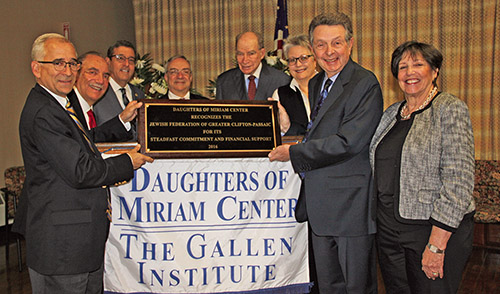
Clifton—Commemorating nearly half a century of partnership, Daughters of Miriam Center/The Gallen Institute unveiled a plaque in recognition of the contributions of the Jewish Federation of Greater Clifton-Passaic to the Center. Daughters of Miriam Center President Jeff Silvershein and Executive Director Fred Feinstein welcomed Federation Board members Gordon Braverman, Joan Gottlieb, Jane Gurtman Grubin, Herb Klein, Mark Levenson, and Morris Yamner to the Center for the tribute ceremony.
With a combined history of almost 200 years, Daughters of Miriam Center and the Jewish Federation of Greater Clifton-Passaic have served generations of residents and families in the Jewish communities in northern New Jersey with services and programs that care for everyone from infants to the elderly. Often these same clients and family members of Federation programs such as Jewish Family Services and the Holocaust Resource Center find a home at Daughters of Miriam Center’s skilled nursing facility or independent living senior apartments, or are clients of the Center’s subacute and rehabilitation services. Jewish children in the area also participate in cross-generational programs at Daughters of Miriam Center, participating in holiday celebrations and activities side-by-side with the Center’s senior residents. “The Federation’s partnership with the Center has helped Daughters of Miriam integrate families and children into our programs so that our residents and tenants continue to feel connected to the larger Jewish community,” stated Daughters of Miriam Center’s Executive Director Fred Feinstein.
As part of one of the largest, strongest and most enduring networks of social services in North America, the Jewish Federation’s mission of building and strengthening Jewish communities ties in with the Daughters of Miriam Center’s efforts to provide a caring, dignified, kosher community for seniors who are no longer able to live independently. Both the Center and Federation help to connect people of all ages to Jewish experiences, no matter their age.
Additionally, philanthropic support from the Federation has played an integral role in the renovation of the physical spaces within the Center, including the expanded rehabilitation department. The state-of-the-art rehabilitation department features stations that include stairs, parallel bars, free weights, recumbent bikes and treadmills. Occupational therapy workstations also help patients who need to gain dexterity and flexibility. Patients being discharged from the hospital to the Center for rehabilitation now have a greater chance of returning home with the ability to live independently due to the efforts, skills and resources of the rehabilitation department.
“Funds earmarked for the Daughters of Miriam Center’s subacute rehab program provide a valuable community service. With the graying of America, we are seeing more and more people who need physical therapy to help with their quality of life and their ability to continue living in their homes rather than being institutionalized. With less and less government and public funding, the Center relies on the Federation’s generosity to continue providing these transformative services,” remarked Center President Jeff Silvershein.
Daughters of Miriam Center/The Gallen Institute is a state-of-the-art long-term-care and subacute facility providing broad-based services to seniors. Emphasizing a continuum of care focus, Center divisions include a skilled nursing facility, a subacute care wing, a dementia-care pavilion, a rehabilitation program, a sheltered workshop, hospice care, a respite program and senior housing with supportive services.
Founded in 1921, the Center is a non-profit, non-sectarian organization licensed by the New Jersey Department of Health, accredited by the Joint Commission on Accreditation of Healthcare Organizations and serves as a university-affiliated teaching center.
The Center’s mission is to provide quality healthcare services and housing for seniors in an environment that enhances and respects individualized traditions and lifestyles. It works to meet the emerging needs in the community and to advance geriatric care through research.










